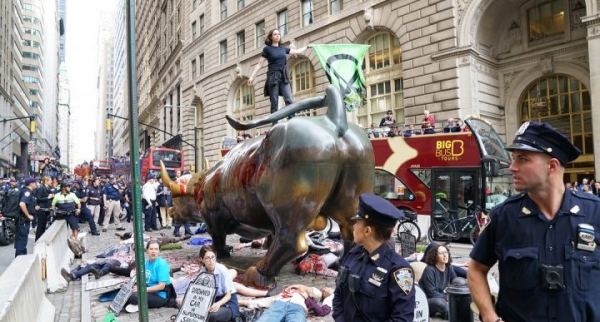Please change the way you think about protest
How? Learning from churches, of course.

An article at the Canberra Times explains how and why “the LEFT needs to change the way it thinks about protest “. This post is how I would rewrite the core part of that article, if I were given the assignment to highlight its universal value, not just for “the left”. But before that…
Warning, and Mandatory Explanation
In the text below, “church” explicity means “EVERY religious COMMUNITY”, in the WIDEST sense of the word “religious”; “Sane” means “sincerely, actively devoted to the COMMON/greater good”, not just to save its own few members, and hate, or ignore, everybody else”.
My version of “changing the way EVERYBODY should think about protest”
Margaret Mead (probably) said, at least fifty years ago): “Never doubt that a small group of thoughtful, committed citizens can change the world; indeed, it’s the only thing that ever has." Decades later, someone else pointed out that the quote only applies to ORGANIZED citizens. A few years ago Erica Chenoweth showed that “it takes around 3.5 per cent of the population actively participating in a protest to ensure serious political change”.
A theoretically obvious corollary of such statements may be that doing so should be much easier, thanks to digital social networks. Whether that is true or not, is another issue, of course.
Fact is, those insights and guidelines are obscured more and more frequently by that general, probably more urgent issue of our times that is: “Can we unify typically fragmented, issue-based groups into an open, belief-accepting community?"
All responsible citizens looking for a positive answer to that question could benefit from broadening their definition of what it means to protest.
Flooding the streets with signs and chants, fighting slogans with slogans, excludes everyone who doesn’t like big crowds, can’t take time off work, or lives too far away. And street protests cannot last forever. Oh, and online protests and campaigns have exactly the same limits.
What if we directed the big burst of energy from protests into smaller, more frequent gatherings? What if a life lived in protest involved taking time out every weekend to gather and serve your local community? In other words…
Why not learn from… CHURCHES?
Why not join together under a more unified story, young and old, to sing, read, mediate, serve the poor, and develop dense, permanent networks with people beyond one’s immediate interest groups?
Because that’s what religious organisations successfully do.
Sane churches offer belonging and meaning. Unlike social media, they welcome and befriend new people, every weekend, and encourage people to explore life’s purpose, every weekend, with positive mental health benefits.
Members of sane churches don’t need to bring a city to a standstill to make a point. Because they’re organised, have a common story that connects them, know who they are, all the time.
Get smarter. Learn how sane churches build spiritual community, without shouting, and start doing the same. Because it’s good for wellbeing, and it works.
(This post was drafted in April 2020, but only put online in August, because… my coronavirus reports, of course)
Who writes this, why, and how to help
I am Marco Fioretti, tech writer and aspiring polymath doing human-digital research and popularization.
I do it because YOUR civil rights and the quality of YOUR life depend every year more on how software is used AROUND you.
To this end, I have already shared more than a million words on this blog, without any paywall or user tracking, and am sharing the next million through a newsletter, also without any paywall.
The more direct support I get, the more I can continue to inform for free parents, teachers, decision makers, and everybody else who should know more stuff like this. You can support me with paid subscriptions to my newsletter, donations via PayPal (mfioretti@nexaima.net) or LiberaPay, or in any of the other ways listed here.THANKS for your support!